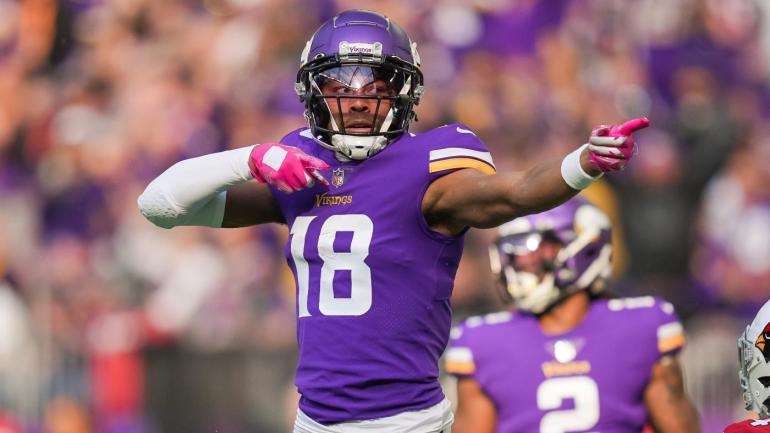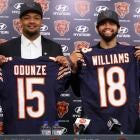
Vikings general manager Kwesi Adofo-Mensah called a Justin Jefferson contract extension a high priority during his NFL Combine press conference at the end of February. With the Vikings completing the signing of their draft class, a new deal for Jefferson should move to the top of Minnesota's to-do list.
Jefferson is scheduled to make a fully guaranteed $2,399,473 in 2023 on a $4,175,438 salary cap number. His 2024 salary is $19.473 million because the Vikings picked up his fully guaranteed fifth-year option.
Nobody has ever had a more productive start to an NFL career at wide receiver than Jefferson as 2020's 22nd overall pick has 324 receptions for 4,825 yards and 25 touchdowns during his first three seasons. Jefferson's 128 catches and 1,809 receiving yards not only led the NFL last season but are the seventh and sixth best single-season totals in league history. He was named 2022's NFL Offensive Player of the Year and earned All-Pro honors for a third straight year (second team in 2020 and 2021) because of his efforts. His 96.5 receiving yards per game are the most in NFL history.
Jefferson hasn't been taking part in the Vikings' voluntary offseason workouts. Missing the two-day mandatory minicamp to be held on June 13-14 would subject Jefferson to a $49,379 fine.
Ideally, the Vikings will reach an agreement with Jefferson before the mandatory minicamp. There are multiple factors that could complicate a deal.
Wide receiver market
Jefferson's performance warrants him becoming at least the NFL's highest-paid wide receiver. Tyreek Hill set the wide receiver market. He signed a four-year, $120 million contract extension, averaging $30 million per year, in March 2022 as a part of his trade from the Chiefs to the Dolphins.
The extension has $72.2 million in guarantees where $52.535 million was fully guaranteed at signing. Realistically, Hill has a three-year extension for $75 million because of $45 million in 2026, the final contract year.
Davante Adams is next at $28 million per year. He received a five-year, $140 million contract from the Raiders also in March 2022 when he was traded by the Packers after being designated as a franchise player. There are $65.67 million in guarantees, of which $42.75 million was fully guaranteed at signing in the deal. The maximum value of Adams' contract is $141.25 million because of an annual $250,000 Pro Bowl incentive.
In actuality, Adams has $67.5 million for three years because there's $72.5 million over the last two years. Odds are he isn't going to play 2025 and 2026 for $36.25 million each when he's 32 and 33 years old.
The Vikings could claim that Cooper Kupp is really the league's highest-paid wide receiver because the Hill and Adams deals are misleading due to artificially inflated salaries at the back of their deals specifically included for cosmetic purposes. Kupp signed a three-year, $80.35 million extension with the Rams, averaging $26,783,333 per year last June. The deal has a wide receiver record $75 million in guarantees, of which $35 million was fully guaranteed at signing.
Wide receivers as NFL's highest paid non-quarterbacks
Jefferson would be justified in setting his sights on becoming the NFL's highest-paid non-quarterback. The current benchmark is Rams interior defensive lineman Aaron Donald. The three-time NFL Defensive Player of the Year signed a three-year, $95 million contract, averaging $31,666,667 per year, last June. Donald's deal is unique because $40 million was added to his existing deal without the Rams getting any new contract years in return.
There is precedent for a wide receiver being the league's highest-paid non-quarterback. It has happened four times since the 2011 NFL Collective Bargaining Agreement was ratified.
The seven-year, $113 million extension, averaging $16,142,857 per year, Larry Fitzgerald received from the Cardinals in 2011 shortly after the lockout ended put him at the top of the non-quarterback salary hierarchy. Less than a year later, Calvin Johnson surpassed Fitzgerald when he signed a seven-year, $113.45 million extension with the Lions in 2012, averaging $16,207,143 per year.
Hopkins eclipsed Chargers edge rusher Joey Bosa's $27 million per year when he signed a two-year, $54.5 million extension, averaging $27.25 million per year, with the Cardinals right before the start of the 2020 regular season, although he had three years left on his existing contract. Negotiations are about how much new money and how many new contract years are being added when a player has contract years remaining. Outside of Donald's case, negotiations when there are existing years aren't operating as if deals are being ripped up like a player wasn't already under contract.
Hill had the distinction of being the NFL's first $30 million-per-year non-quarterback with his Dolphins contract. The Vikings might beg to differ because of Hill's unrealistic salary in his final year inflating the value of his deal.
Potential structural issues
Contract structure might be the biggest sticking point with a Jefferson deal because the Vikings' conventions with salary guarantees are slightly different than how most teams operate. All of Minnesota's lucrative veteran contracts signed in recent years, with the exception of quarterback Kirk Cousins, have been structured where the only money fully guaranteed at signing consists of the first-year base-salary guarantee and a signing bonus. The signing bonuses have been relatively modest.
The three-year contract Cousins signed in 2018 to join the Vikings as an unrestricted free agent was fully guaranteed. Cousins' subsequent extensions have had the second year fully guaranteed at signing. Any third-year guarantee has been for injury upon signing where the conversion to being fully guaranteed comes a year early (i.e.; Cousins' injury guaranteed 2022 base salary was fully guaranteed in 2021). These mechanisms are customary around the NFL with high-end contracts.
For every other Vikings player, base-salary guarantees after the first contract year have been for injury only initially at signing and typically become fully guaranteed on the third day of the league year in each specific year (i.e.; an injury guaranteed 2025 base salary is fully guaranteed in March 2025).
The Seahawks are one of the few teams that don't fully guarantee the second year at signing with veteran contracts. A trade-off has been Seattle giving large signing bonuses. For example, DK Metcalf's $30 million signing bonus was the biggest ever for a wide receiver when the Seahawks signed him to a three-year, $72 million extension, averaging $24 million per year, last July.
Any new deal Jefferson signs should set a new standard for overall guarantees with wide receiver contracts that eclipses Kupp's $75 million. This means there should be guarantees into Jefferson's fourth contract year or second new-year contract, which will be 2026.
It may require not only a record signing bonus for a wide receiver but with non-quarterbacks as well for Jefferson to accept a deal where an injury guarantee in 2026 would convert to being fully guaranteed in March 2026 on the third day of the 2026 league year instead of in March 2025 on the third day of the 2025 league year. The $40 million signing bonus Donald got in his 2018 extension is the most ever for a non-quarterback.
Contract length
Jefferson should look to limit the length of the extension to three years based on recent trends with wide receiver contracts. A deal where Jefferson gave up three new years would put him under contract through 2027.
Three-year deals or three-year extensions were the most common length in last year's explosion of the wide receiver market where 11 players signed contracts, averaging $20 million per year or more. Seven players (Chris Godwin, Kupp, Terry McLaurin, Metcalf, D.J. Moore, Deebo Samuel and Mike Williams) gave up three new years in their deals.
Five of the 11 wide receivers signed extensions of rookie contracts. Four of the five (McLaurin, Metcalf, Moore and Samuel) received three-year extensions. A.J. Brown was the lone exception. He signed a four-year, $100 million extension, averaging $25 million per with year, in connection with his trade from the Titans to the Eagles during the first round of the 2022 NFL Draft.
Randy Moss treatment
Jefferson isn't the only Vikings wide receiver selected in the first round to have a prolific start to an NFL career. Randy Moss, who slipped to the 21st pick in the 1998 draft, had 226 receptions for 4,163 yards and 43 receiving touchdowns in 48 games during his first three seasons. His yards and touchdown catches still rank second and first all time after three seasons.
The Vikings rewarded Moss with a seven-year extension, averaging $9.3 million per year, in 2001 after three NFL seasons when he was heading into his contract year. The maximum value of the Moss deal was $73.85 million thanks to salary escalators and incentives. Moss became the NFL's second-highest-paid non-quarterback behind Giants defensive Michael Strahan.
Executive vice president of football operations Rob Brzezinski negotiated the deal on behalf of the Vikings. He has been managing the salary cap and negotiating contracts so long in Minnesota that I dealt with him as an agent on linebacker Ed McDaniel and Hall of Fame defensive tackle John Randle's deals.
Jefferson can make a good case that the Vikings should treat him equal to or better than Moss especially considering the team's continuity with negotiators. The salary cap was $67.405 million in 2001 when Moss signed. Moss' extension translates to $31,016,097 per year in today's $224.8 million salary cap environment.
Final thoughts
Regardless of whether the Vikings make Jefferson the NFL's highest-paid non-quarterback or just wide receiver, he should, at a minimum, be the first wide receiver to hit the $30 million-per-year mark on a deal that isn't artificially inflated by a high salary in the final contract year(s). Should Jefferson become the league's highest-paid non-quarterback, he will likely have a short stint if signed in a timely fashion. Any type of reset of the non-quarterback pay scale would surely serve as the salary floor for reigning NFL Defensive Player of Year Nick Bosa. The 49ers edge rusher, who is set to play this season under a fully guaranteed $17.859 million, fifth-year option, is expected to sign a new deal at some point before the 2023 regular season starts.






















